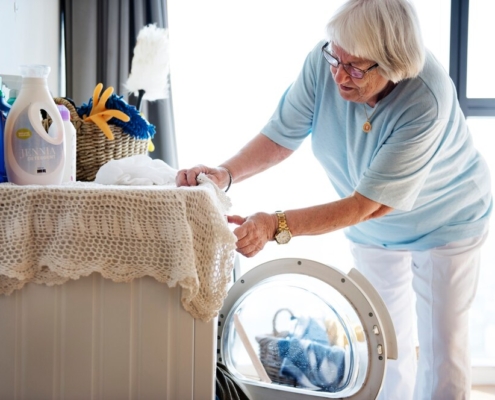How to Prevent Mold and Mildew in Your Washing Machine
 Keeping your washing machine free from mold and mildew is crucial for maintaining its efficiency and ensuring your clothes come out fresh and clean. Mold and mildew not only lead to unpleasant odors but can also cause health issues if not addressed promptly.
Keeping your washing machine free from mold and mildew is crucial for maintaining its efficiency and ensuring your clothes come out fresh and clean. Mold and mildew not only lead to unpleasant odors but can also cause health issues if not addressed promptly.
In this article, we will explore effective strategies to prevent mold and mildew in your washing machine. Whether you’re a homeowner looking to keep your laundry area pristine or someone needing professional appliance repair in Atlanta, these tips will help you maintain a well-functioning washer.
Article Summary:
- The Causes of Mold and Mildew in Washing Machines
- Regular Washer Maintenance
- Simple Steps to Keep Your Washing Machine Clean
- Best Practices for Using Detergents and Fabric Softeners
- How to Properly Ventilate Your Laundry Area
- Signs Your Washer Needs Professional Repair
- Benefits of Hiring Professional Appliance Repair Services
- Tips for Choosing the Right Appliance Repair Company
- Atlanta Washer Repair Services
1. The Causes of Mold and Mildew in Washing Machines
Mold and mildew thrive in dark, damp, and warm environments – making washing machines an ideal breeding ground. These fungi can enter your washer through dirty clothes or build up from soap scum, lint, and other residues left behind after each wash cycle.
Moreover, leaving wet clothes inside the washer for extended periods can also promote mold and mildew growth. The combination of moisture and warm temperatures provide the perfect conditions for these microorganisms to multiply quickly.
2. Regular Washer Maintenance
One of the best ways to prevent mold and mildew in your washing machine is by performing regular washer drum maintenance. This includes cleaning the drum, gasket, dispenser, and filter at least once a month to remove any build-up of dirt and residue. Additionally, it is crucial to follow the manufacturer’s instructions for properly maintaining your specific washer model.
Regular maintenance not only prevents mold and mildew but also helps prolong the lifespan of your washing machine. Neglecting maintenance can lead to costly repairs or even the need for a replacement in severe cases.
3. Simple Steps to Keep Your Washing Machine Clean
Aside from regular maintenance, there are simple steps you can take to keep your washing machine clean and free from mold and mildew. These include:
- Leaving the lid or door open after each use to allow air circulation and prevent moisture build-up.
- Wiping down the drum, gasket, and dispenser with a mixture of equal parts water and vinegar to remove any residue.
- Running an empty cycle with hot water and 1 cup of baking soda or bleach once a month to kill any mold or mildew present.
4. Best Practices for Using Detergents and Fabric Softeners
Using too much detergent or fabric softener can leave behind residues that promote mold and mildew growth. It is essential to follow the recommended amounts and avoid overfilling the dispenser. Additionally, using natural or eco-friendly detergents can help reduce the build-up of harsh chemicals in your washer.
5. How to Properly Ventilate Your Laundry Area
Proper ventilation in your laundry area is essential to prevent mold and mildew from developing in and around your washing machine. Start by ensuring there is adequate airflow; open windows or install an exhaust fan to help dissipate moisture. Make it a habit to leave your washer door open after each use, allowing the interior to dry out completely.
If possible, use dehumidifiers to reduce humidity levels, especially during humid weather. It’s also beneficial to clean and inspect your dryer vents regularly to ensure they are not clogged, as blocked vents can trap moisture in your laundry space. By implementing these ventilation practices, you can create a drier environment that discourages mold and mildew growth, keeping your washing machine and surrounding area fresh and sanitary.
6. Signs Your Washer Needs Professional Repair
Here are some serious signs that your washer is in need of service from a professional appliance repair company:
- Persistent Mold and Mildew Odors: If you notice that mold and mildew odors persist even after thorough cleaning, it might indicate an underlying issue that requires professional attention.
- Water Leaks: Any signs of water leaking from your washing machine can lead to mold growth and should be addressed by a repair specialist.
- Unusual Noises: Loud banging, grinding, or squeaking sounds during operation can signal mechanical problems that need expert repair.
- Inefficient Cleaning: Clothes coming out of the wash still dirty or soapy may indicate that the washer is not functioning correctly.
- Error Codes: Modern washing machines often display error codes when something is wrong; consult a professional to diagnose and fix these issues.
- Excessive Vibration: Excessive shaking or moving during cycles can damage internal components and should be evaluated by a technician.
- Slow Drainage: If your washer takes too long to drain, or doesn’t drain at all, there could be a blockage or pump issue that needs professional intervention.
Refer to our guide “Signs It’s Time For a New Washer/Dryer” to see if you should consider replacing your appliance.
7. Benefits of Hiring Professional Appliance Repair Services
 Hiring a professional for your washing machine repair not only saves you time and effort but also ensures the problem is correctly diagnosed and fixed. Professionals have the necessary skills, knowledge, and tools to handle different types of washer repairs and prevent further damage to your appliance.
Hiring a professional for your washing machine repair not only saves you time and effort but also ensures the problem is correctly diagnosed and fixed. Professionals have the necessary skills, knowledge, and tools to handle different types of washer repairs and prevent further damage to your appliance.
8. Tips for Choosing the Right Appliance Repair Company
When choosing the right appliance repair company, keep these tips in mind:
- Check for Proper Licensing and Certifications: Ensure the company holds the necessary licenses and certifications to perform appliance repairs.
- Read Customer Reviews: Look for feedback from previous customers to assess the company’s reputation and quality of service.
- Ask About Experience: Inquire about the technicians’ experience with repairing washing machines, particularly mold and mildew issues.
- Compare Pricing: Get quotes from multiple companies to ensure you’re getting a fair price for the repair services.
- Inquire About Warranty: Choose a repair service that offers a warranty on their work to guarantee quality and peace of mind.
- Verify Insurance Coverage: Ensure the company has proper insurance to cover any potential damages during the repair process.
9. Atlanta Washer Repair Services
If you live in the Atlanta area and need professional washer repair services, Comfort Appliance Repair is here to help. Our team of experienced technicians is trained to handle all types of washing machine repairs, including mold and mildew removal.
We are dedicated to providing exceptional customer service. Contact us at Comfort Appliance Repair today for trusted Atlanta washer repair as well as dryer repair, dishwasher repair and dependable services to fix any of your major appliances.
By Dennis Godynuk, Owner of Comfort Appliance Repair
Dennis Godynuk is the owner of Comfort Appliance Repair in Covington, GA. Comfort Appliance provides fast and reliable repair services for all major household appliances. Dennis and his team of experienced technicians can tackle any problem, from broken refrigerators to malfunctioning dishwashers, and their prices are very competitive. Customers can rest easy knowing that their appliances are in good hands when they call Comfort Appliance Repair.



